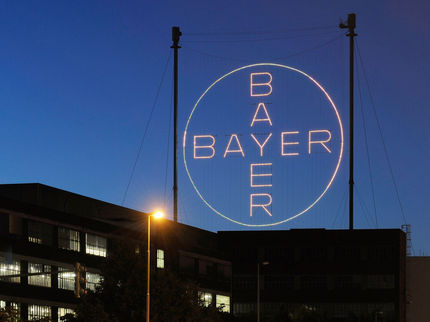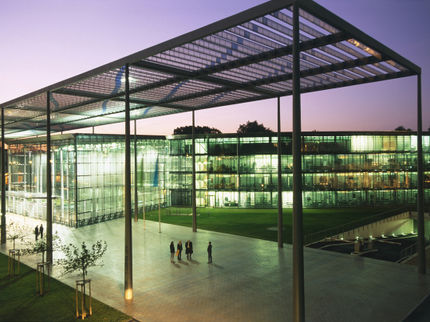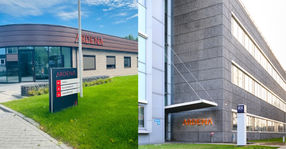Merck Generates Profitable Growth in Q3 2019
Merck generated strong organic sales growth and benefited from positive foreign exchange effects in the third quarter of 2019. EBITDA pre increased even more strongly than net sales in the three-month period from July to September. Following the closing of the Versum Materials (Versum) acquisition in October, Merck is raising its full-year forecast for sales and EBITDA pre in 2019.
“In the third quarter, we continued to resolutely implement our strategy. We substantially increased sales and earnings thanks to the strong performance of Healthcare and Life Science as well as all regions. With the successful acquisition of Versum at the beginning of October, Performance Materials achieved a key milestone of its Bright Future transformation program,” said Stefan Oschmann, Chairman of the Executive Board and CEO of Merck. “Now we are focusing on generating cash and consequently rapidly lowering our debt,” added Marcus Kuhnert, member of the Executive Board and Chief Financial Officer.
Group net sales rose by 8.1% to € 4,054 million (Q3 2018: € 3,749 million). Group organic sales growth, which was fueled by the Healthcare and Life Science business sectors, amounted to 5.7% or € 213 million. The currency-driven sales increase of 2.7% or € 102 million was mainly due to the U.S. dollar, the Japanese yen and the Chinese renminbi.
EBITDA pre, the Group’s most important earnings indicator, increased by 15.4% to € 1,111 million; the EBITDA pre margin improved to 27.4% (Q3 2018: 25.7%) The development of EBITDA pre reflects organic growth of 9.8%, positive exchange rate effects of 5.8%, and a negative portfolio effect of –0.1%. The increase in EBITDA pre, which was more pronounced than that of sales, was attributable to strong sales growth, a greater focus on costs, income from the alliance with GlaxoSmithKline as well as the continued margin improvement in Healthcare and Life Science. The operating result (EBIT) thus also increased by 23.8% to € 608 million (Q3 2018: € 491 million).
Net income (profit after tax attributable to Merck KGaA shareholders) increased slightly by 0.8% to € 343 million (Q3 2018: € 340 million). Earnings per share pre improved by 2.3% to € 1.35 (Q3 2018: € 1.32).
Net financial debt amounted to € 7.32 billion on September 30, 2019, which was around € 500 million less than at the end of the second quarter of 2019 (€ 7.83 billion). Merck had 54,042 employees worldwide on September 30, 2019.
Profitable growth in the first nine months as well
In the first nine months of 2019, net sales increased by 7.5% to € 11,771 million (January-September 2018: € 10,949 million). During the same period, EBITDA pre increased by 11.5% and amounted to € 3,179 million (January-September 2018: € 2,850 million). This increase was mainly organic (9.2%). The EBITDA pre margin rose by one percentage point to 27.0% (January-September 2018: 26.0%). Earnings per share pre increased by 3.3% to € 4.02 (January-September 2018: € 3.89).
Healthcare achieves double-digit sales growth
In the third quarter of 2019, the Healthcare business sector increased sales by 10.0% to € 1,756 million (Q3 2018: € 1,596 million). Organic growth amounted to 8.0%; the currency-related increase was 2.0%. The strong business performance was mainly due to Mavenclad as well as the high demand for our medicines in China, such as for the fertility medicine Gonal-f, the diabetes treatment Glucophage and the oncology drug Erbitux.
With Mavenclad for the oral treatment of multiple sclerosis, Merck generated sales of € 89 million in the third quarter of 2019 (Q3 2018: € 25 million), an increase of 45% in comparison with Q2 2019 (€ 61 million). Mavenclad was also approved in the United States in March 2019. Owing to the continued difficult competitive situation in the interferon market as well as competition from oral dosage forms, Rebif, which is used to treat multiple sclerosis, saw a double-digit organic decline of -15.1%. Including a positive exchange rate effect of 2.8%, sales amounted to € 318 million (Q3 2018: € 363 million). Sales of the immuno-oncology medicine Bavencio increased to € 29 million (Q3 2018: € 19 million). In May 2019, Bavencio was approved in the United States in combination with axitinib for the treatment of patients with advanced renal cell carcinoma. Approval in Europe followed on October 28. In the third quarter of 2019, sales of the oncology drug Erbitux increased organically by 5.1% to € 222 million (Q3 2018: € 212 million). The favorable growth is largely due to the addition of Erbitux to the NRDL (National Reimbursement Drug List) in China. Sales of Gonal-f, the leading recombinant hormone for the treatment of infertility, increased to € 206 million (Q3 2018: € 182 million). In particular, performance in North America and China contributed to this with double-digit organic growth rates.
EBITDA pre of Healthcare soared by 31.3% to € 501 million in the third quarter of 2019 (Q3 2018: € 381 million). Here, the upfront payment from the alliance with GlaxoSmithKline to co-develop and co-commercialize the bifunctional immunotherapy bintrafusp alfa again had a positive effect of around € 30 million. Organic earnings growth amounted to 24.8% and was supported by positive exchange rate effects of 6.5%.
Life Science once again sees strongest contribution to sales from Process Solutions
In the third quarter of 2019, the Life Science business sector increased its net sales by 12.3% to € 1,715 million over the year-earlier quarter (Q3 2018: € 1,527 million). This reflects strong organic sales growth of 10.0%, positive foreign exchange effects of 3.0%, and a negative portfolio effect of –0.7% from the divestment of the Flow Cytometry business. All three business units and all regions contributed to organic growth. In early October, Merck acquired FloDesign Sonics of the United States, which has a unique acoustic cell processing platform for the industrialization of cell and gene therapy manufacturing.
The Process Solutions business unit, which markets products and services for the entire pharmaceutical production value chain, generated organic sales growth of 15.6%, which was the highest rate within the Life Science business sector. Assisted by favorable foreign exchange effects of +3.4%, net sales totaled € 756 million in the third quarter of 2019 (Q3 2018: € 636 million). The Research Solutions business unit, which provides products and services to support life science research for pharmaceutical, biotechnology, and academic research laboratories, recorded a 5.2% organic increase in sales. Supported by positive foreign exchange effects of 2.9%, net sales amounted to € 540 million (Q3 2018: € 500 million). With its broad range of products for researchers as well as scientific and industrial laboratories, the Applied Solutions business unit recorded strong organic sales growth of 6.8% in the third quarter of 2019. Assisted by favorable foreign exchange effects of 2.6%, sales totaled € 418 million in the third quarter of 2019 (Q3 2018: € 392 million).
The Life Science business sector increased its EBITDA pre by 15.4% to € 531 million (Q3 2018: € 460 million). This double-digit growth was primarily organic (+13.7%), yet it was also supported by foreign exchange effects (+1.9%). The portfolio effect was –0.3%.
Foreign exchange effects partly compensate for organic sales decline in Performance Materials
In the third quarter of 2019, sales of the Performance Materials business sector decreased by –6.9% to € 583 million (Q3 2018: € 626 million). In the first half of 2019, the Display Solutions business unit still noticeably benefited in the Liquid Crystals business from individual customer capacity expansion projects in China. In the third quarter of 2019, the decline in the Liquid Crystals business already forecast in the previous year continued. The organic decline of –10.6% was partly offset by positive foreign exchange effects of 3.7%. This resulted mainly from a stronger U.S. dollar in comparison with the previous year as well as Asian currencies, such as the Taiwan dollar and the Japanese yen.
The Display Solutions business unit, consisting mainly of the business with liquid crystals, photoresists for display applications and OLED materials, as expected, recorded an organic decline of –15.1% in the third quarter of 2019. This decrease was partly offset by exchange rate effects (+3.5%). Consequently, sales fell by a total of –11.6% to € 316 million (Q3 2018: € 357 million). The Semiconductor Solutions business unit comprises the business with materials used in integrated circuit production. Overall, in the third quarter of 2019, customer silicon wafer production output remained below expectations against the backdrop of continued weakness in the semiconductor market. Owing to weak market conditions, sales declined organically by –3.5%. However, this was more than offset by positive exchange rate effects of 4.8%; sales amounted to € 154 million (Q3 2018: € 152 million). In the third quarter of 2019, net sales of the Surface Solutions business unit declined organically by –6.2%. Including positive foreign exchange effects (+3.1%), sales amounted to € 112 million (Q3 2018: € 115 million). The decline was attributable to weaker demand, particularly from the automotive industry, as well as the increased portfolio focus on industrial applications within the scope of the Bright Future transformation program.
EBITDA pre of Performance Materials decreased by –12.7% to € 177 million (Q3 2018: € 203 million). Organically, EBITDA pre declined by –19.3%; foreign exchange effects of +6.7% partly compensated for this.
Merck completed the acquisition of the U.S. company Intermolecular on September 20 and that of Versum Materials on October 7. The acquisitions will strengthen Performance Materials and considerably expand the company’s position as a leading supplier of electronic materials for the semiconductor and display industries. In 2019, Versum will be consolidated for the 86 calendar days until year-end, contributing to sales and EBITDA pre.
Forecast raised following the acquisition of Versum
Merck continues to expect for the full year 2019 a moderate organic net sales increase of 3% to 5% over the previous year. For fiscal 2019, Merck expects a portfolio effect from the Versum acquisition of around € 270 million on Group sales. Overall, net sales of the Merck Group in 2019 are forecast to be between € 15.7 billion and € 16.3 billion (previously: € 15.3 billion to € 15.9 billion; 2018: € 14.836 billion). Merck continues to expect a strong organic increase in EBITDA pre compared with the previous year. The contribution from the legacy Versum business to EBITDA pre is forecast at around € 80 million to € 90 million. In addition, Merck continues to expect a positive foreign exchange effect of 0% to 2% compared with 2018. Group EBITDA pre for 2019 is forecast overall in a corridor between € 4.23 billion and € 4.43 billion (previously between € 4.15 billion and € 4.35 billion; 2018: € 3.80 billion).























































